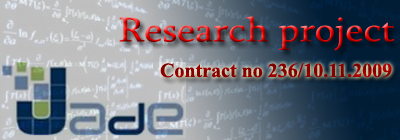This project represents a research in developing a new methodology for implementing multi-agent applications that have to be deployed on lightweight devices such as mobile phones and PDAs.
Agent-based software engineering is a relatively new field and can be thought of as a evolution of object-oriented programming. There is a current lack of mature agent-based software development methodologies. This deficiency has been pointed out as one of the main barriers to the large-scale uptake of agent technology. Thus, the continued development and refinement of methodologies for the development of multi-agent systems is imperative, and consequently, represents an area of agent technology deserving significant attention. An agent-oriented methodology enables designers to clearly specify and structure their applications as multi-agent systems. The new methodology is intended for the LEAP add-on, which combined with JADE, provides a modified run-time environment for enabling FIPA agents to execute on lightweight devices running Java (Java version) or on devices running Microsoft .NET Framework.
Designing and building high quality industrial-strength software is difficult. Against this background, a wide range of software engineering paradigms have been devised (procedural programming, structured programming, declarative programming, object-oriented programming, design patterns, application frameworks and component-ware).
If agents are to realize their potential as a software engineering paradigm, then it is necessary to develop software engineering techniques that are specifically tailored to them. Existing software development techniques (for example, object-oriented analysis and design) are unsuitable for this task. There is a fundamental mismatch between the concepts used by object-oriented developers and the agent oriented view. In particular, extant approaches fail to adequately capture an agent's flexible, autonomous problem solving behaviour, the richness of an agent's interactions, and the complexity of an agent system's organizational structures.
There are four fundamental phases to the software development lifecycle: planning, analysis, design, and implementation. When implementing the software development lifecycle, it is often useful to have some formal guidelines (i.e. a list of steps and deliverables) on how to progress through these phases. This is the task of a methodology. A methodology saves time and effort by crystallizing the important steps that the designer should follow, and as a result, providing them with the right “direction”.
Agent-based software engineering is a relatively new field and can be thought of as a evolution of object-oriented programming. There is a current lack of mature agent-based software development methodologies. This deficiency has been pointed out as one of the main barriers to the large-scale uptake of agent technology. Thus, the continued development and refinement of methodologies for the development of multi-agent systems is imperative, and consequently, an area of agent technology deserving significant attention.
An agent-oriented methodology enables designers to clearly specify and structure their applications as multi-agent systems.
The purpose of the research project is the development of the M-JADE methodology. This new methodology is intended for the LEAP add-on, which combined with JADE, provides a modified run-time environment for enabling FIPA agents to execute on lightweight devices running Java (Java version) or on devices running Microsoft .NET Framework.
The research activity attempts to formalize the analysis and design phases of the agent-based software development life cycle and also to develop methods/ techniques for agent-user interactions in multi-agent applications deployed on mobile devices.
The M-JADE methodology does not attempt to extend object-oriented techniques, instead focusing on agents specifically and the abstractions provided by the agent paradigm. Furthermore, it will combine a top-down and bottom-up approach so that both existing system capabilities (including those provided by legacy software and people) and the applications overall needs (based on the requirements) can be considered.
The design phase specifically focuses on the JADE platform (with LEAP add-on), and the concepts provided by it. JADE is the abbreviation for the Java Agent DEvelopment Framework and has been developed by the Telecom Italia Lab (TILAB) in Italy, in compliance with the FIPA (Foundation for Intelligent Physical Agents) specifications.
By specifically focusing on the JADE platform in the design phase, the designers can move straight to implementation afterwards, without having to tediously adapt the results of the design phase to an agent platform of their choice. This will obviously result in significant time gains for the designers, in addition to providing them with a much clearer picture on how to progress in implementation.
|



